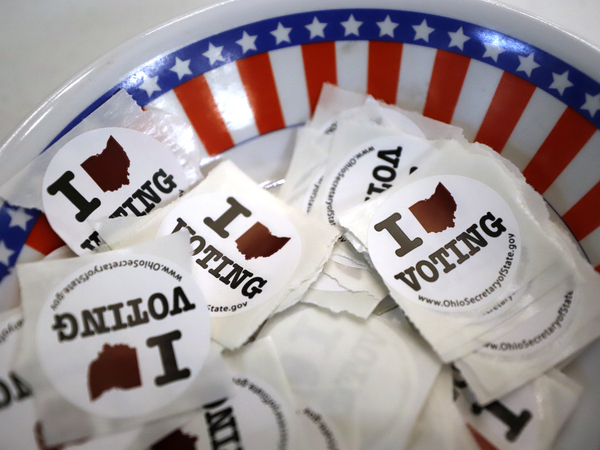Ohio, Kentucky move to postpone primaries amid coronavirus outbreak
Go Deeper.
Create an account or log in to save stories.
Like this?
Thanks for liking this story! We have added it to a list of your favorite stories.

Two more states, including Ohio which was slated to vote Tuesday, have announced their intention to delay their presidential primaries due to health concerns about the coronavirus.
Ohio Gov. Mike DeWine and Secretary of State Frank LaRose say they are trying to postpone in-person voting until June 2. And Kentucky, which was supposed to vote May 19, will now vote June 23, according to Secretary of State Michael Adams.
Ohio's announcement came at roughly the same time that President Trump was laying out new guidelines for Americans that include avoiding gatherings of more than 10 people for the rest of the month.
"It is clear that tomorrow's in-person voting does not conform and cannot conform with these [health] guidelines," DeWine said. "We cannot conduct this election tomorrow, the in-person voting for 13 hours tomorrow, and conform to these guidelines."
Turn Up Your Support
MPR News helps you turn down the noise and build shared understanding. Turn up your support for this public resource and keep trusted journalism accessible to all.
Unlike many states, Ohio's governor and secretary of state don't have the power to delay the election on their own. Instead, they are supporting a lawsuit filed by people who believe they're vulnerable to the virus and the state does not plan to contest the suit.
"People should not have to choose between their rights and their health," said DeWine.
The primary seems likely to be delayed, according to Daniel Tokaji, an election law expert at Ohio State University, because "all the major players, including the governor, the secretary of state and importantly the leaders of the two major parties, all agree that under the circumstances, the best course of action is to move the primary back."
A number of voting-rights advocacy groups also supported the decision, including the League of Women Voters and the Lawyers' Committee for Civil Rights Under Law.
Ohio Democratic Party Chairman David Pepper released a statement shortly after the briefing that supported the idea of cancelling in-person voting Tuesday. But he did also leave open the door for other potential plans.
"Extending an election is an unprecedented step, so we as a party are weighing alternatives on how to best do so — including the possibility to conduct the primary election entirely by vote-by-mail, as is done in several other states, with a deadline much earlier than June 2," Pepper said. "This could better serve the interests of Ohio voters and the primary process that is already well underway."
Pepper said the party would consider submitting those alternatives to the court once the lawsuit is filed.
In Kentucky, state law allows the secretary of state and governor to jointly decide to change the date of an election due to a declared state of emergency.
A potential 'lifesaver'
In a statement, LaRose said the sudden decision, made just a day before the Ohio election, was made after "new information" about the virus led the Ohio Department of Health to recommend that all Ohioans age 65 and older to self-quarantine.
Under the plan he is proposing, absentee voting would be allowed to continue until June 2, and all votes that have already been cast would be counted as normal.
It is possible, Tokaji says, that the state is still dealing with the public health crisis in June, but the delay would give voters the ability to adjust.
"The difference is that those vulnerable voters will have plenty of time to request an absentee ballot in advance so they can vote safely from their homes," he said.
President Trump said Monday that he thought postponing the primaries was "unnecessary" but also said the decision was ultimately up to the respective states.
If a court allows Ohio's proposed delay, the state will become the fourth state to postpone its primary due to the coronavirus. Louisiana announced late last week it would push its April primary to June, while Georgia announced over the weekend that its March 24 primary would be moved to May. Separately, Alabama is considering postponing its March 31 U.S. Senate primary runoff.
"In retrospect, it may be that we view these delays as being lifesavers," said Charles Stewart, an elections expert at the Massachusetts Institute of Technology. "On the other hand, it could be that we view the delays as being overreaches. We just don't know at this point.”
Copyright 2020 NPR. To see more, visit https://www.npr.org.



